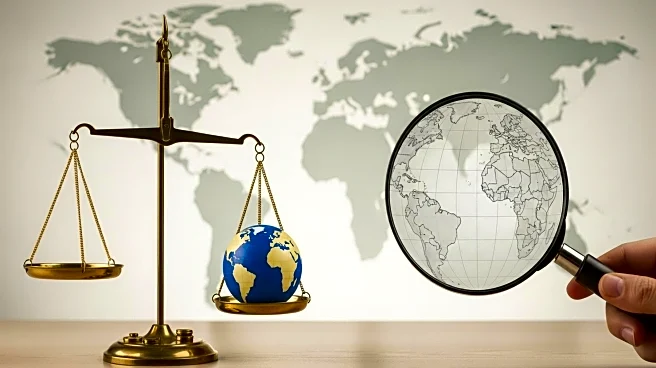What's Happening?
The United Nations Human Rights Office has updated its database of businesses involved in Israeli settlements in the occupied West Bank. The update includes 158 business enterprises from 11 countries, with 68 new companies added to the list. These businesses are involved in activities such as supplying equipment for construction, demolition of Palestinian property, surveillance, and pollution. The UN emphasizes the responsibility of businesses to ensure their activities do not contribute to human rights abuses. States are urged to act diligently to prevent business-related human rights violations in conflict-affected areas.
Why It's Important?
The update to the UN database underscores the ongoing international concern regarding human rights violations in conflict zones, particularly in the occupied West Bank. Businesses involved in these activities face scrutiny and potential reputational damage, which could impact their operations and profitability. The UN's actions highlight the importance of corporate responsibility and adherence to human rights standards, influencing global business practices and policies. This development may also affect diplomatic relations and international trade, as countries and companies navigate the complexities of operating in conflict-affected regions.
What's Next?
Businesses listed in the UN database are expected to review their operations and ensure compliance with international human rights standards. The UN may continue to monitor and update the database, potentially adding more companies or removing those that have ceased involvement in concerning activities. Governments and international organizations might increase pressure on businesses to adhere to ethical practices, possibly leading to legislative changes or sanctions. Stakeholders, including civil society groups, may advocate for stronger enforcement of human rights protections in business operations.
Beyond the Headlines
The UN's focus on business activities in conflict zones raises broader ethical questions about corporate responsibility and the role of businesses in perpetuating or mitigating human rights abuses. This development may prompt discussions on the legal obligations of companies operating in such areas and the effectiveness of international guidelines in preventing human rights violations. The situation also highlights the challenges of balancing economic interests with ethical considerations, potentially influencing future business strategies and international policies.









